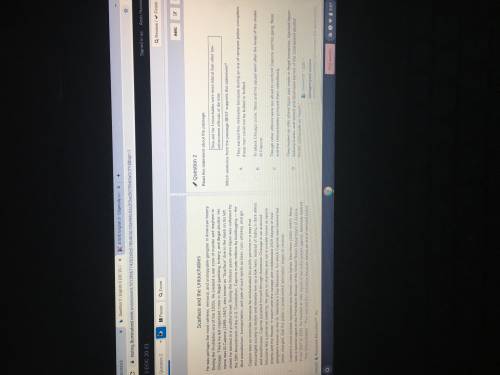Answer this question
...

Answers: 1
Other questions on the subject: English

English, 21.06.2019 21:30, coreybro
Read the excerpt from julius caesar, act 1, scene 1. marullus. wherefore rejoice? what conquest brings he home? what tributaries follow him to rome to grace in captive bonds his chariot wheels? you blocks, you stones, you worse than senseless35 things! o, you hard hearts, you cruel men of rome, knew you not pompey? many a time and oft have you climbed up to walls and battlements, to towers and windows, yea, to chimney-tops, your infants in your arms, and there have sat40 the livelong day, with patient expectation, to see great pompey pass the streets of rome. which summary of the passage is the best? marullus asks a lot of questions, such as, “why celebrate? what has caesar done? who is following him to rome? don’t you remember pompey? ” then he says that everyone is cruel because they do not remember pompey. they forget how they praised him and would climb to the highest places, carrying their children, just to catch a glimpse of him. marullus regrets that the people are celebrating caesar and is insulted that they forgot how they used to praise pompey. marullus thinks that the people should celebrate caesar the way they used to celebrate pompey, and that they should be in awe of caesar’s greatness. marullus remembers how the people climbed walls, battlements, towers, windows, and even chimney tops to see the great pompey.
Answers: 1

English, 22.06.2019 09:30, glowbaby123
Those are books that need to be returned to the library what is the antecedent of the pronoun those
Answers: 1


English, 22.06.2019 13:00, AaronEarlMerringer
In another country by ernest hemingway (excerpts) excerpt 1 "in the fall the war was always there, but we did not go to it any more. it was cold in the fall in milan and the dark came very early. then the electric lights came on, and it was pleasant along the streets looking in the windows. there was much game hanging outside the shops, and the snow powdered in the fur of the foxes and the wind blew their tails. the deer hung stiff and heavy and empty, and small birds blew in the wind and the wind turned their feathers. it was a cold fall and the wind came down from the mountains." excerpt 2 "the people hated us because we were officers, and from a wine-shop someone called out, "a basso gli ufficiali! " as we passed. another boy who walked with us sometimes and made us five wore a black silk handkerchief across his face because he had no nose then and his face was to be rebuilt. he had gone out to the front from the military academy and been wounded within an hour after he had gone into the front line for the first time. they rebuilt his face, but he came from a very old family and they could never get the nose exactly right. he went to south america and worked in a bank. but this was a long time ago, and then we did not any of us know how it was going to be afterward. we only knew then that there was always the war, but that we were not going to it any more." 19 select the correct answer. what important fact about the wounded soldiers is reflected by the repetition of the bolded sentences in the excerpts from "in another country" by ernest hemingway? a. it establishes the irony that, although the wounded soldiers have physically left the warfront, the war continues to haunt them psychologically. b. it shows the gradual loss of hope and growing depression of the wounded soldiers and their need for distractions. c. it establishes the wounded soldiers’ determination to shun war and disobey military commands to return to the front after they recover. d. it shows the wounded soldiers’ sadness and disappointment at the lack of gratitude from the people they risked their lives to protect. e. it shows the wounded soldiers’ belief that the war would never end, even as thousands of soldiers were killed or wounded and sent to hospitals. reset next
Answers: 1
Do you know the correct answer?
Questions in other subjects:

Mathematics, 30.11.2019 14:31



English, 30.11.2019 14:31



English, 30.11.2019 14:31

Biology, 30.11.2019 14:31

History, 30.11.2019 14:31








